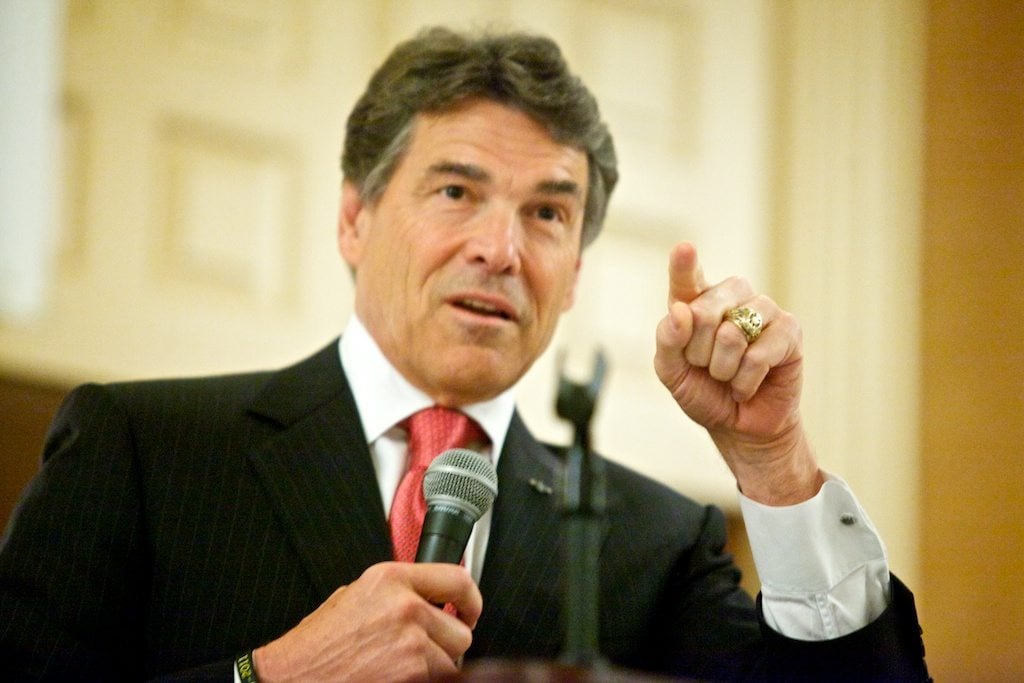
The Future of ‘Corporate Welfare’ in Texas after Rick Perry

Is it too early to consider Rick Perry’s legacy? Some state lawmakers already are, at least indirectly.
Legislators are considering what to do with some of the guv’s signature programs, the big corporate subsidy funds that have been plagued by charges of cronyism and inefficiency since their inception. Funding for the Texas Enterprise Fund and the Texas Emerging Technology Fund, in particular, is dwindling due to lawmakers’ reluctance to keep pouring dollars into what some critics consider Perry’s corporate welfare accounts. The Observer, for example, reported on a $12 million Texas Enterprise Fund grant to Chevron for a Houston office tower that the company had announced years before. Chevron, in fact, planned to spend the money not to create new jobs, which were already in the works, but on generous moving costs for its employees.
Overall, the Texas Enterprise Fund alone has doled out more than $500 million in grants since the Legislature created it a decade ago. In 2010, the Observer found—in a story appropriately titled “Slush Fun“—that 20 of the 55 Enterprise Fund companies had either given money directly to Perry’s campaign or donated to the Republican Governors Association, a Washington, D.C.-based group that Perry presided over in 2008.
All of that is on Rick Perry. But it’s up to the Legislature and the next governor—either Wendy Davis or, more likely, Greg Abbott—whether to shut down the funds, or modify them.
Today, a House committee heard from a parade of economic development types, including governor’s office personnel overseeing the funds, who argued that the programs are a key ingredient in the supposed “Texas miracle economy.”
“Don’t screw up the basics,” said Jonathan Taylor, Perry’s economic development director. “But also recognize that all those incentives are must-haves now.”
The timing of the hearing was perfect. Perry is on one of his frequent job-hunting trips, this time in New York, where he’s been repeating his challenge to New York Gov. Andrew Cuomo to debate, as he put it on Twitter today, “creating jobs and free marketing [sic] policies.”
Indeed, the message from business interests and the governor’s people at today’s hearing was that the programs were too burdensome for applicants—though, of course, that was dressed up as needing more “flexibility.” Taylor urged the Legislature, citing competition from other states, to consider shrinking the turnaround for Enterprise Fund grants from 90 days to two weeks.
Prompted by questions from lawmakers, Taylor and his counterpart at the Emerging Technology Fund, Terry Hazell, also cautioned the Legislature not to move control of the funds out of the governor’s office.
“You get in front of the people who actually make the decisions,” Taylor said, of why companies like working with the governor’s office. “You get to talk to the decision-makers.”
Of course that goes straight to one of the core criticism of the Enterprise Fund, the Emerging Tech Fund, the Cancer Research and Prevention Institute of Texas and all the other big pools of money that flow through the guv to big and powerful interests—that they’re not so much technocratically managed job-creating programs as political slush-funds that haven’t proven claims about job creation.
Hazell said today that the Emerging Tech Fund didn’t track return on investments for individual companies and that the overall return was “modest.”
Lingering over the discussion today was the question of what Wendy Davis and Greg Abbott think about these programs. Neither has said anything definitive.
Abbott has been particularly cagey. In July, when asked directly, he told the Houston Chronicle:
“If we can create the appropriate tax structure, that’s going to be the strongest incentive any business needs, whether it be businesses thinking about relocating from California or businesses already here.”
Davis, for her part, has said she supports the premise of a job-creating program like the Texas Enterprise Fund but has pushed for more accountability and transparency. In 2013, she co-authored legislation requiring the state auditor to take a closer look at whether the Enterprise Fund was following the law.


